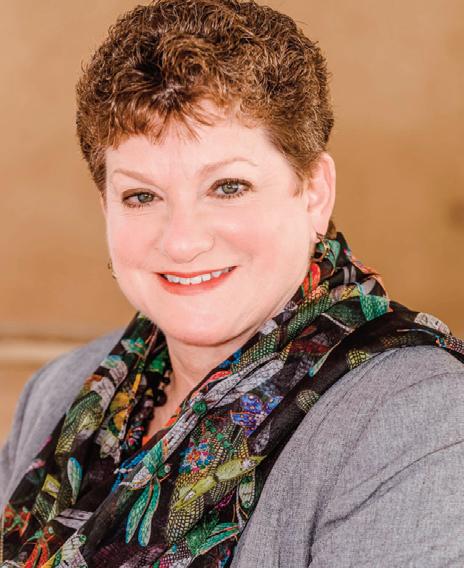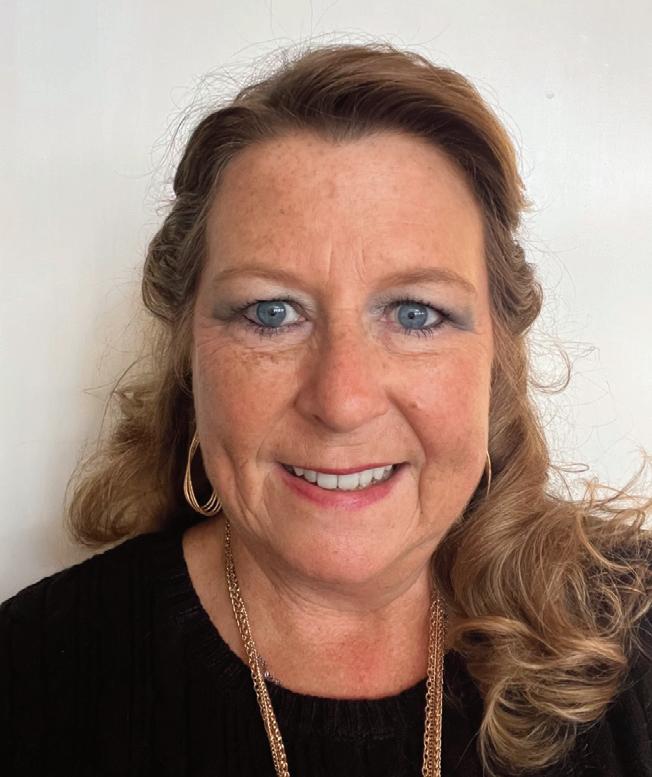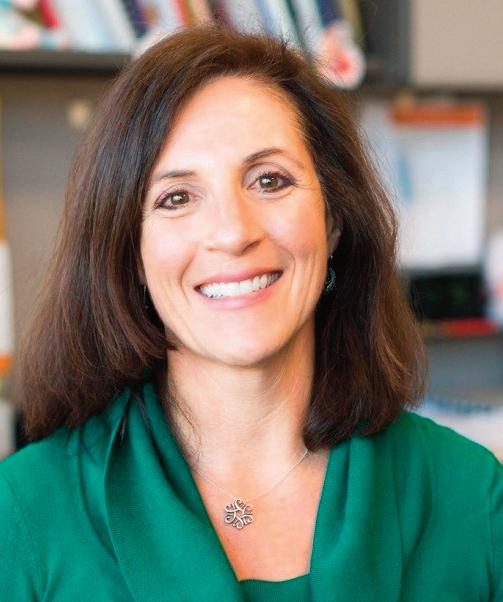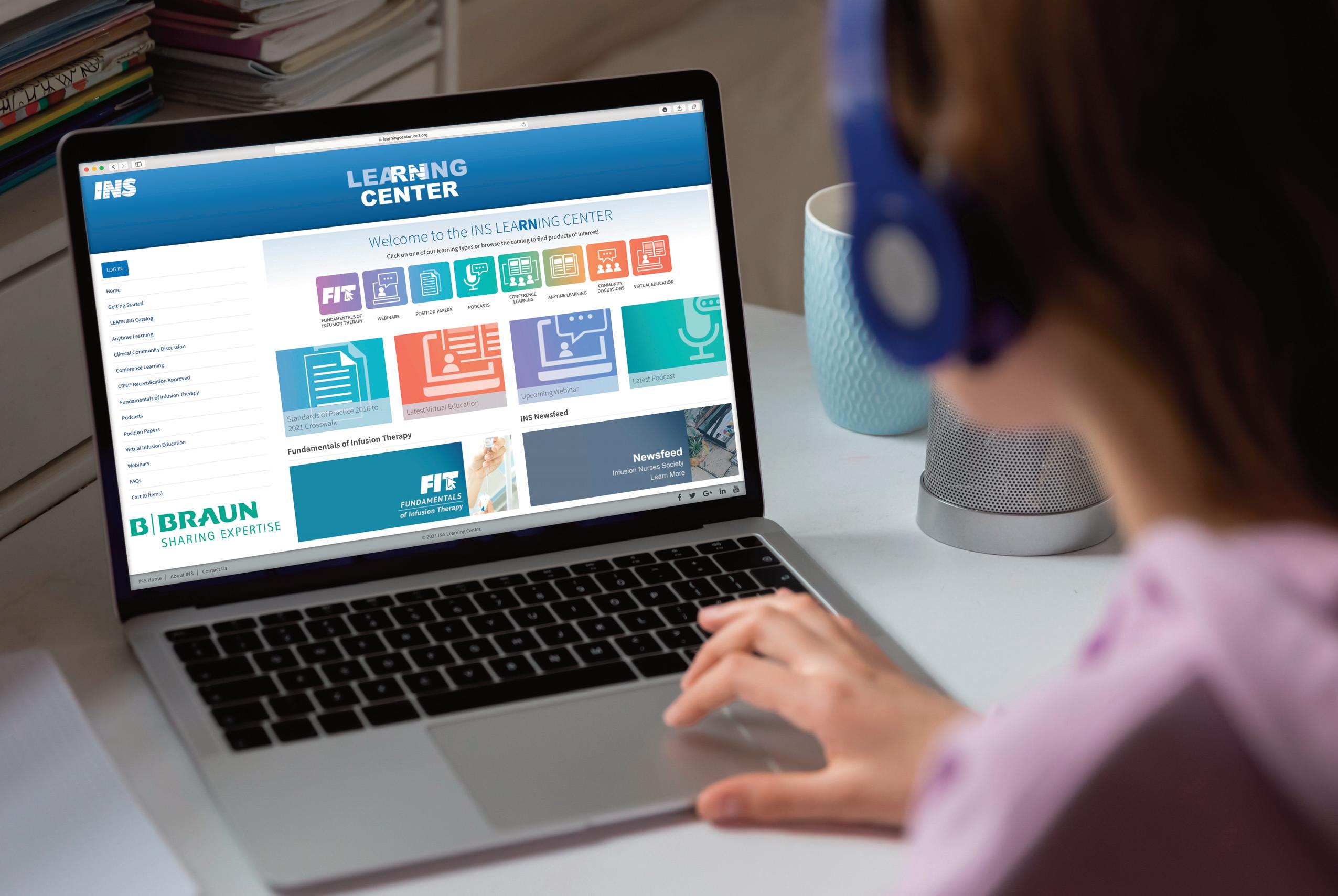

JANUARY/FEBRUARY 2021 INSIDER JANUARY/FEBRUARY 2023 VOLUME 6 • ISSUE 1 INFUSION NURSES SOCIETY Member Updates: Recent Accomplishments, Awards, and Promotions Welcome New Members Testimonials for IV Nurse Day from Two Long-Term CRNI ® s The Value of Expertise
INSider encourages the submission of articles, press releases, and other materials for editorial consideration, which are subject to editing and/or condensation. Such submissions do not guarantee publication. If you are interested in contributing to INSider, please contact the INS Publications Department. Photos become the property of INSider; return requests must be in writing. INSider is an official bimonthly publication of the Infusion Nurses Society.
©2023 Infusion Nurses Society, Inc. All rights reserved. For information contact: INS Publications Department One Edgewater Drive, Suite 209
MA 02062 (781)
rachel.king@ins1.org INSIDER THE OFFICIAL MEMBERSHIP NEWS PUBLICATION OF INFUSION NURSES SOCIETY FUSION NURSES SOCIETY INS BOARD OF DIRECTORS 2023-2024 PRESIDENT Inez Nichols, DNP, FNP-BC, CRNI®, VA-BC PRESIDENTIAL ADVISOR Sue Weaver, PhD, RN, CRNI®, NEA-BC SECRETARY/TREASURER Joan Couden, BSN, RN, CRNI® DIRECTORS-AT LARGE Nancy Bowles, MHA, RN, OCN®, CRNI®, NEA-BC, CPC, CHONC Pamela McIntyre, MSN, RN, CRNI®, IgCN, OCN® PUBLIC MEMBER Lisa M. Ong, CPA, PCC CHIEF EXECUTIVE OFFICER Mary Alexander, MA, RN, CRNI®, CAE, FAAN INS STAFF Chief Executive Officer: Mary Alexander, MA, RN, CRNI®, CAE, FAAN Executive Vice President: Chris Hunt Director of Operations and Member Services: Maria Connors, CAE Director of Publications and Educational Design: Dawn Berndt, DNP, RN, CRNI® Marketing Manager: Whitney Wilkins Hall Editorial Production Coordinator: Rachel King Director of Clinical Education: Marlene Steinheiser, PhD, RN, CRNI® Education and Member Services Project Manager: Jill Cavanaugh Meetings Manager: Meghan Trupiano, CMP Certification Administrator: Darlene Leuschke Senior Certification & Member Services Associate: Maureen Fertitta Member Services Associate: Susan Richberg Bookkeeper: Cheryl Sylvia INFUSION NURSES SOCIETY
Norwood,
702-5908

In this Issue 3 5 9 11 13 16 President’s Message: The Value of Expertise Inez Nichols, DNP, FNP-BC, CRNI®, VA-BC INS Learning Center Webinars and Podcasts Welcome New INS Members Domestic and International Cover Story: Testimonials for IV Nurse Day from Two Long-Term CRNI®s INSide Scoop Membership Updates New Professional Accomplishments
The Value of Expertise
The Infusion Nurses Society (INS) has a respected and successful tenure of viability and global recognition as the authoritative organization promoting best infusion and vascular access practices. As INS has now reached its 50th anniversary, it’s a privilege to recognize the administrative and clinical experts who have contributed to its global status and accomplishments. This recognition includes the long-term expert staff at the INS headquarters and the multitude of clinical experts, both of whom have provided countless hours to the organization’s longevity, development of INS education, and continuity of the Infusion Therapy Standards of Practice over the years.

The Dreyfus Model of Skill Acquisition as applied by Patricia Benner supports this reflection from a novice level to that of expert. The novice to expert model has been used extensively as rationale for career development and education since the 1980s. This model posits five stages necessary in skill attainment and development. These include novice, advanced beginner, competent, proficient, and expert. Expertise develops when one tests and refines propositions, hypotheses, and principle-based expectations in actual practice or administrative situations. Areas often cited for application of this paradigm include management, career enhancement, clinical specialization, staff development programs, professional staffing, evaluation, and precepting novices.
Over the previous decades, a plethora of articles have been composed based on Benner’s model, several having been research-based studies. One of these was published by Nichols and Humphrey in the Journal of Infusion Nursing and described the expert clinician utilizing peripherally inserted central catheter (PICC) placement at the bedside with the advanced technological adjuncts of ultrasound (US) and modified Seldinger technique (MST). With said adjuncts, the clinician at the expert level is relaxed and has a feel for making the right choices, decisions, or moves when placing a PICC with US and MST. This individual is polished in the learned skill, and the performance is intuitively carried out without conscious mental exertion. The skill is so innate that the clinician demonstrates the procedure with a performance that is fluid and seamless. The focus is on action and not the recall of organization, priority setting, or task completion.
INSider 3
PRESIDENT’S MESSAGE
Inez Nichols
DNP, FNP-BC, CRNI®, VA-BC
Another applicable clinical example is the use of intravenous electrocardiography (IV-ECG) guidance for PICC tip positioning in the cavoatrial junction. The expert clinician is comfortable with the procedure and has an instinctual perception for producing the best selections or movements when placing a PICC while utilizing IV-ECG guidance. This clinician is refined in the learned skill, and the routine is subconsciously carried out without conceptual effort. Again, the skill is so inherent that the clinician demonstrates the procedure as a smooth, unified routine rather than focusing on equipment set-up or steps of the procedure.
Over the past five decades, the INS staff and board has adapted in order to provide clinician training and education, from novices to experts, in a rapidly changing health care environment. This involved (1) the strategic vision and mission that developed INS’ compass, (2) the established feasible and attainable goals reflective of the vision, (3) the objectives constructed to achieve those goals, (4) the implemented and executed tactics to achieve those goals in a culture that encouraged continuous improvement and work efficiency, and (5) the evaluation and measurement of performance.
INS provides resources and learning opportunities for clinicians at every level of their practice. Novices and advanced beginner clinicians can become competent clinicians through engaging in the Fundamentals of Infusion Therapy (FIT) program and/or by taking the CRNI® exam. Proficient and expert clinicians can serve as a board member, as a reviewer for the Journal of Infusion Nursing, as a member of the Standards of Practice Committee, a national council on education (NCOE) member and/or as a presenter at INS Annual Meetings. All levels of clinicians benefit from the ongoing education at INS, such as in-person and virtual meetings, the INSider, the Journal of Infusion Nursing, and podcasts and webinars.
INS provides resources and learning opportunities for clinicians at every level of their practice. Novices and advanced beginner clinicians can become competent clinicians through engaging in the Fundamentals of Infusion Therapy (FIT) program and/or by taking the CRNI® exam.
The longevity and expertise of the entire INS staff make these initiatives possible, professional, and effective. Over the years, the staff has understood and successfully implemented publications, resources, and learning activities that align with the organization’s strategic plan. Their dedication has yielded the current diverse group of over 5,000 members whose needs are served from the level of novice to that of the expert. Because of the expertise of the INS staff and board and the variety and depth of INS resources, I am confident that the next 50 years of INS will continue to be full of excellence, integrity, inclusiveness, and innovation.
References
Benner P, Benner PE. From Novice to Expert. Pearson; 2001.
Benner P. et al. Becoming an expert nurse. Am J Nurs. 1997;97(6): 16BBB, 16DDD. McEwen, M. Wills, EM. Theoretical Basis for Nursing. 6th edition. Wolters Kluwer; 2021.
Nichols, I. Intravenous Electrocardiography for Peripherally Inserted Central Catheter Tip Positioning [Doctoral dissertation]. Jacksonville, FL: University of North Florida; 2017.
Nichols I, Humphrey JP. The efficacy of upper arm placement of peripherally inserted central catheters using bedside ultrasound and microintroducer technique. J Infus Nurs. 2008;31(3):165-176. doi:10.1097/01.NAN.0000317703.66395.b8
Vanderburg, E. (2004, March 9). 5 Essential Tasks of Strategic Management. https://medium.com/@evanderburg/5-essential-tasks-of-strategic-management-57d7bc097cc7
Inez Nichols, DNP, FNP-BC, CRNI®, VA-BC, is a nurse practitioner currently licensed in Florida and Georgia. She is a hospitalist/infusion and vascular specialist at the Madison County Memorial Hospital in Madison, Florida. Career roles have integrated acute care, primary care, and occupational health care, as well as incorporated patient education, nursing education, and outcomes of monitoring related to infusion therapy. Inez attended the University of North Florida and completed the Doctor of Nursing Practice (DNP) in 2017. Professional contributions include active work within professional nursing organizations, particularly INS, where she has been a member for over 20 years and served in various roles, including a chapter liaison (Southeast), in chapter leadership, a Vesicant Task Force member, an INCC examination council member and secretary, and as the 2018-2020 INS secretary/treasurer. She has served as a Journal of Infusion Nursing reviewer beginning in 2003 and has published widely within this specialty field.
4
4 January/February 2023
Testimonials for IV Nurse Day from Two Long-Term CRNI® s

Sandra Herring, RN, CRNI®

Sandra has been in nursing for 37 years, and a CRNI® since 1998. She is passionate about helping people. Currently, she works as an infection control practitioner, clinical educator, employee health nurse, and infusion specialist. Areas of practice through the years include acute care, medical/surgical nursing, labor and delivery, homecare and hospice, long term acute care, and specialty home infusion therapies.
Her interests outside of work include church, spending time with family, horses, and pretty much any water activity—whether participating or just observing. She is married to her lifelong best friend, Ken, and has been very blessed with two children (and their spouses), Sarai Barnett (Wes), Chase (Colleen), and a very special granddaughter Patrycja Barnett.
How did you originally hear about INS?
I first heard of INS from a colleague.
What drew you to the organization?
The validation and confidence to know I was using the very best standards for infusion therapy.
What do you think is the most valuable aspect of being a CRNI®?
The most valuable aspect of being a CRNI® is having the knowledge to practice infusion nursing and bring the best possible care to my patients.
5 INSider
What meetings or other educational programs have been the most useful to you?
The educational programs that have been most helpful to me are the in-person and virtual national meetings, and the online learning center. Personally, I prefer the in-person meetings for the additional networking opportunities. However, this year I was physically unable to attend the national meeting in person, and the virtual meeting proved to be wonderful as well.
How have you used the Standards or other INS publications in your day-to-day work?
I have used the INS Standards in my day-to-day work providing direct and indirect patient care. Direct patient care speaks for itself. I also use INS Standards with indirect care, including mentoring my coworkers, encouraging my colleagues, writing infusion-related work such as policy/procedures, and in writing and presenting educational work in-services.
Compare and contrast the INS of the past to the INS of the present. What has changed? What has remained the same?
Many things have changed from the past to present INS. For example, I can remember accessing patient catheters through a “rubber stopper.” Change occurred, and we moved to use of a negative pressure needleless connector, then a positive pressure connector. Change occurred yet again and we went to a neutral pressure needleless connector. INS has consistently evolved through the years to advance with the various changes relating to infusion therapy.
The constant that has remained the same with INS is the commitment to promote excellence in the field of infusion care.
What would you tell someone to encourage them to become a CRNI®?
Becoming a CRNI® is the first step to being confident in your nursing care related to infusion therapy. It opens up innumerable networking opportunities to help in your infusion nursing practice.
Is there anything else you’d like to share?
The only thing that is constant is change. For our patients, we must keep learning and adapting to provide the best possible care. Thanks to INS, we can keep learning, adapting, and growing!
Alicia Mares, BSN, RN, CRNI®
Alicia, the associate director of Global Medical Affairs at BD, has been a CRNI® since 1999. Alicia has over 35 years of experience in the field of infusion therapy and vascular access. Her field of practice include pediatrics and infusion therapy in both the hospital and home settings. Over her career, Alicia has developed and implemented a home infusion therapy program, developed numerous infusion therapy and vascular access education and training programs, and overseen quality improvement programs. Working with research and development engineers, Alicia has provided clinical input into the development of a multitude of infusion therapy products. She has also been a contributor to several clinical research studies and programs with vascular access devices.

Alicia is a certified registered nurse in infusion therapy (CRNI®). She was a reviewer for the 2011, 2016, and 2021 Infusion Therapy Standards of Practice and is currently an editorial reviewer for the Journal of Infusion Nursing. Alicia lectures domestically and internationally on a variety of infusion therapy topics.
How did you originally hear about INS? What drew you to the organization?
When I began working in home infusion therapy, I had a lot of questions and wanted to ensure I was performing the best practice for my patients. When seeking out information, I came across the Infusion Nurses Society and found it to be a great resource for what I was in looking for.
6 January/February 2023
What do you think is the most valuable aspect of being a CRNI®?
Having the CRNI® credential gives me credibility as a subject matter expert in the practice of infusion therapy. Although many don’t know what CRNI® stands for, it provides me the opportunity to educate what the credential is, and why it’s important to the services that I provide.
What meetings or other educational programs have been the most useful to you?
The annual meeting and various webinars are a good way to stay current with practice changes, product innovation, and general infusion therapy topics—as well as to network. While there isn’t a local INS chapter in my area, I have attended chapter meetings in various states over the years and found them to be another tool for networking as well as keeping up-to-date on regional and local trends.
How have you used the Standards or other INS publications in your day-to-day work?
While my hard copy of the Standards is well-worn, I’ve embraced the electronic version too and found it to be valuable when searching on a particular topic. The Standards have been an integral part of my career. I use them as a resource when developing educational programs, lecturing on infusion therapy, training clinicians on a new vascular access device, answering questions, or providing clinical input to a variety of projects and initiatives I’m involved in. The JournalofInfusion Nursingassists me with evidence and real-world examples of infusion therapy practices, problems, and gaps. The Policies and Procedures for Infusion Therapy are my go-to resource for when I need very specific information that the Standards are not able to provide.
Compare and contrast the INS of the past to the INS of the present. What has changed? What has remained the same? While INS has always been committed to education and publication of the Standards of Practice, they weren’t always based on evidence like they currently are. The INS of today is more inclusive and collaborative with a broader array of clinicians and health care organizations.
Renewal of the CRNI® credential has also changed over the years. You can now get credits by in other ways besides attending the annual meeting in person, making it easier to maintain the credential.
One thing that has remained steady over the years is the committed INS leadership. The leadership team has grown but remains steadfast in their mission INS recognizes that relationships and partnerships with manufacturers are important but has solid boundaries in place so there isn’t any undue influence.
What would you tell someone to encourage them to become a CRNI®? A CRNI® will give you a wealth of knowledge and help you be better with all aspects of infusion therapy. You can utilize this knowledge to help make positive changes within your organization and inspire others to improve the quality of care they deliver. Make the commitment and you’ll be glad you did.
Is there anything else you’d like to share?
After delaying getting my CRNI® for several years, I finally made the commitment. I had to travel out of state to a testing center to take my CRNI® exam. Thankfully my employer was willing to cover the cost of a plane flight, hotel room, and transportation. This motivated me even more to do all I could to make sure I passed the exam. I wasn’t certain I would get another chance and it was cost-prohibitive for me to do this on my own.
7
INSider
RSES N
Compassion Runs in Our Veins
Each year on January 25, INS celebrates IV Nurse Day to recognize the importance of the infusion specialty. This year’s theme, “Compassion Runs in Our Veins,” speaks to the commitment that makes infusion nurses so valuable – continuing education, advocacy, and professional development.

IV IV NURSE DAY HAPPY
INFUSION NURSES SOCIETY
Membership Updates
INS is pleased to recognize the following individuals for their recent accomplishments, awards, and promotions.
Do you have an accomplishment, award, and/or promotion you’d like to share?
If so, please email rachel.king@ins1.org.
Yuri Paola Alvarado Vargas, RN, a professional nurse at the Hospital Regional José Davida Padilla Villafañe in Aguachica, Cesar, Colombia, earned the fifth award in all of Latin America from Becton Dickinson as an expert in vascular access. He is in charge of placing PICCs and monitoring the care and maintenance of vascular access devices.
Michelle Basteen, RN, VA-BC, CRNI®, a nurse manager and vascular access nurse at Catalina Pointe Rheumatology and Arthritis and Tucson Medical Center, was a recipient of The Gardner Foundation INS Meeting Scholarship in 2020.
Victoria Bracken, BSN, RN, a corporate health wellness nurse at Chase Bank, is currently enrolled in the family nurse practitioner program at Walden University.
Karin Cierzan, RN, CGRN, CRNI®, an endoscopy nurse and infusion therapy nurse at MNGI Digestive Health, is the president of the American Board of Certification for Gastroenterology Registered Nurses and was recently reelected to the Minnesota Regional Society of Gastroenterology Nurses and Associates as a director-at-large. She was also selected to speak at the INS Annual Meeting in Boston in April 2023.
Christie Fisher, MSN, MBA, RN, CRNI®, IgCN, the national director of nursing at CarepathRX MSO LLC, recently joined the INS National Council on Education (NCOE).

9 INSider
Membership Updates
William Groben, PharmD, RPh, vice president of infusion operations at Hy-Vee Health PC, was recently promoted from senior director of infusion operations to vice president of infusion operations.
Lisa Gorski, MS, RN, HHCNS, BC, CRNI®, FAAN, is a clinical education specialist at Ascension at Home and author of the book Phillips Manual of IV Therapeutics: Evidence-Based Practice for Infusion Therapy, which was released in November 2022.
Lynn Hadaway, MEd, RN, NPD-BC, CRNI®, president of Lynn Hadaway Associates, Inc., was awarded the Distinguished Alumna Award from Georgia Baptist College of Nursing at Mercer University on October 21, 2022.
Haylee Latta, BA, RN, CPN, staff nurse on the Non-Oncology Infusion Suite University of Iowa Stead Family Children's Hospital, recently completed education and training in ultrasound guided intravenous catheter placement.
Jennifer Larsen, MSN, RN, CRNI®, a nurse manager at the Infusion Therapy Center, Mayo Clinic, received a Spirit of the Clinic Award in December 2021 surrounding the accomplishments of opening a COVID infusion therapy center and setting up infusion nurse teams to deliver monoclonal antibody infusions at a skilled nursing facility to some of the most vulnerable patients during very challenging times.
Maria Luiza Pereira, BSN, CRNI®, an infusion nurse at a cardiology pulmonary hospital in Brazil, recently created an instrument with educational intention to guide the team about the correct application of peripheral intravenous dressings. In a “knowledge box,” she demonstrates the correct way to apply the dressing and how to address the most frequent mistakes, then shared the idea on Instagram and LinkedIn, where others said they adopted it.
Lisa M. Ong, CPA, PCC, president and founder of Wishing Out Loud LLC, and the public member on the INS board, in 2023 will be included in The Dallas 500 for a third time, after also making the list in 2020 and 2021. The Dallas 500 profiles the most influential leaders in North Texas.
Deepa Suresh, BSN, RN, CRNI®, a vascular access team nurse, passed the CRNI® exam in September 2022.
Catherine Swazey, BSN, RN, CRNI®, a field nurse with specialties in wound care and IV therapy at Brightstar Home Health, has received many awards for employee of the month, but her most prized award is the Nurses Week Foundation’s Tucson's Fabulous Fifty Nurses.
Gilda Taylor, RN, CRNI®, a vascular nurse at Salem Hospital, recently attained her CRNI®.
10 January/February 2023
Welcome New Members!
DOMESTIC
Timothy Adams
Anne Marie Adiletta
Ronda Agee
Mira Aguilar
Beverly Anderson
Cathi Anderson
Lisa Anderson
Adrienne Antoniello
Kammy Armstrong
Michelle Benzen
Coralee Bleil
Traci Bowen
Kirsten Boyd
Mindy Boyle
Barbara Brena Marissa Brown
Jennifer Buck
USION NURSES SOCIETY
Makia Calhoun
Stan Carmack
Gregory Carter
Larry Caton
Abby Cheek
Veronica Cheung
Kerry Collins
Beth Cox
Tresa Cunningham
Angela Curry
Sharon Darden
Philo Das
Judith Delismon
Stephanie Dickey
Patricia Dobson
Leslie Echterhoff
Lauren Edwards
Glenda Elam
Mary Emery
Candice Faria
Ron Fay
Ted Fehl
Meg Flynn Harding
Ashley Folck
Heather Foster
Rosaree Gatchalian
Marissa Gehring
Suzanne Glover
Erin Goodman
Jessie Graves
Angela Hammack
Paul Harreld
Kristin Hayes
Holly Henderson
Jemimah Hernandez
Kelli Herrington
Angela Hightower
Julie Hilbun
Niki Hilton
Marcia Hodge
Latice Hollingsworth
Jennifer Houff
Nicholas Houx
Karina Huffaker
Kaitlyn Hydron
Lori Kasubowski
Alexis Keller
F
INSider 11
Janet Kennedy
Bibi Khan
Trisha LaForge
Sheena Lee
Maria Sison Lim
Danielle Long Kassia Luskin
Kelly Lyons
Kathleen MacKerrow
Jennifer Markham
Anna Marlar
Chrishelle Marolf Michelle Marti
Judy Massood
Crystal Mathias
Courtney Mayhue
Amy McClanahan
Erin McMahon Jennifer Meyer
Sarah Mickowski
Brandi Miller
Rosalee Miller
Loretta Myers
Ashley Nevitt Jeannie Oh
Lisa Ong
Josha Pal Sherri Parson
Katrina Pequignot
Celia Pfaff-Jump
Shelley Polikoff
Cosmin Popa Toni Price
Stephanie Redmond
Shelly Richards
Meredith Richardson
Sarah Riggio
Wilmabellis Rodriguez Amy Russell Karen Salinas Noelle Sanchez
Christina Saraf Ellie Schaible
Elisabeth Scheuer-Sturgeon
Courtney Schulte Michelle Searle
Christina Shaw Amanda Shillinglaw Nicole Soutar
Alaina Stegehuis-Wilfer Donna Szarejko
Maggie Thomas Susan Esther Thomas Ashley Torres Ty Treece
Julie Un Tara Vaughn Jennifer Vonnahme
Megan Walker Alexis Wall Jennifer Walsh
Mary Weedn
Rebecca West Reagan Williams Shelley Wilson Quenita Winston
INTERNATIONAL
Kim Young Chan South Korea
Nancy Connor Canada Paul Culley United Kingdom
Joy Garma United Arab Emirates
Launceston General Australia
Stephanie Healey
Canada Hyeyun Jeong South Korea
Ha Jiyeon South Korea Hyun A. Kam South Korea
Eun Jeong Kim South Korea
Haran Lee South Korea
Ji Yeon Park South Korea
Kye Wol Park South Korea
Seon Hee Park South Korea
Soyoon Park South Korea
Manjusha Pillai United Arab Emirates
Naglaa Samy Seddek United Arab Emirates
Hye Won Shin South Korea
12 November/December 2022




View these webinars and more on-demand: www.learningcenter.ins1.org/webinars Listen to these podcasts and more on-demand: www.learningcenter.ins1.org/podcasts Plasma-Derived Medications – Donors Make Them Possible Safe IV Push Medication Administration Practice Chat with Matt: The Importance of Hemodilution in Infusion Therapy The Role of the Infusion Nurse in Monoclonal Antibody Administration 13 INSider Understanding Iron Deficiency Anemia Beyond Burnout: Mind-Body Skills for Healing Together





50thAnniv e yrasr 1973-2023 JOIN US AS WE CELEBRATE OUR WATCH FOR OUR 50 YEAR COMMEMORATIVE EDITION OF THE INSIDER COMING JANUARY 18, 2023.




INSide Scoop
Meetings
INS will celebrate 50 years of setting the standard in infusion therapy at the INS 2023 Annual Meeting, which is shaping up to be a one-of-a-kind experience. By attending INS 2023, you will be invited to the 50th Anniversary Celebration of Excellence on Sunday, April 2 at 7 p.m., an event that will include dinner, drinks, and dancing— and we will also look back over the past 50 years to honor those who have contributed to the success of INS. Register for INS 2023 to be a part of this special event.
Education
More Update on INS 2023
veINS Track
At INS 2023, we have developed sessions devoted to an important aspect of infusion therapy, the vasculature. Without diligent care of our patients’ vasculature, supported by knowledge of the evidence, clinicians cannot safely provide infusion therapy solutions or medications. These selected sessions will provide attendees with evidence from the experts pertaining to vascular access, intravascular infections, vascular access device (VAD) selection, VAD bundles, the impact of vesicant administration upon the vasculature, the significance of flushing, and much more. Speakers from around the world will share their research endeavors and disseminate their findings aimed at improving the care of our patients’ vasculature. Join us for these sessions to learn more about this important aspect of the care we provide for our patients.
Alternative Settings Track
You said it and we listened! Many of you work in alternative care sites such as home infusion, outpatient clinics, and skilled nursing facilities. At INS 2023, we have dedicated a track of sessions which specifically focuses on care provided in alternative care settings. While many other sessions will have integrated considerations for care of patients outside of the acute care setting, these dedicated sessions are being presented by experts in care areas outside of the hospital. Join these sessions to learn more about various disease states, vascular access care, and complication management in alternative settings.
Publications
The Core Curriculum for Infusion Nursing has been recently revised by Cora Vizcarra, MBA, RN, CRNI®, VA-BC, and is slated for publication with Wolters Kluwer Health in 2023. This INS reference is designed as a comprehensive, preparatory resource for the CRNI® exam. The new content outline consists of 3 core areas: Principles of Practice, Access Devices, and Infusion Therapies.
Cora Vizcarra was the president of the Infusion Nurses Society in 2008-2009. She has more than 40 years of health care experience in infusion therapy and vascular access in both the hospital and alternative health care settings. She has published in medical journals, nursing journals, and textbooks on topics related to the infusion nursing specialty and is the author of the online blog infusionnurse.org. She serves on numerous nursing and medical advisory committees, both for profit and nonprofit as an infusion therapy specialist, She is an international and national nurse speaker and currently a clinical educator and infusion nurse consultant for IVSyntrix.
16 January/February 2023
Coming in 2023
A supplemental 50th anniversary INSider will release on Wednesday, January 18, which will include a timeline of the entire 50 years of INS. Check your email inboxes!
You asked and we listened: upcoming 2023 editions of the INSider will include clinical case studies.
In the March/April 2023 INSider, we will celebrate Mary Alexander and her long tenure at INS/INCC. If you have something you’d like to submit for inclusion, email rachel.king@ins1.org.
INSIDER THE OFFICIAL MEMBERSHIP NEWS PUBLICATION OF INFUSION NURSES SOCIETY






















